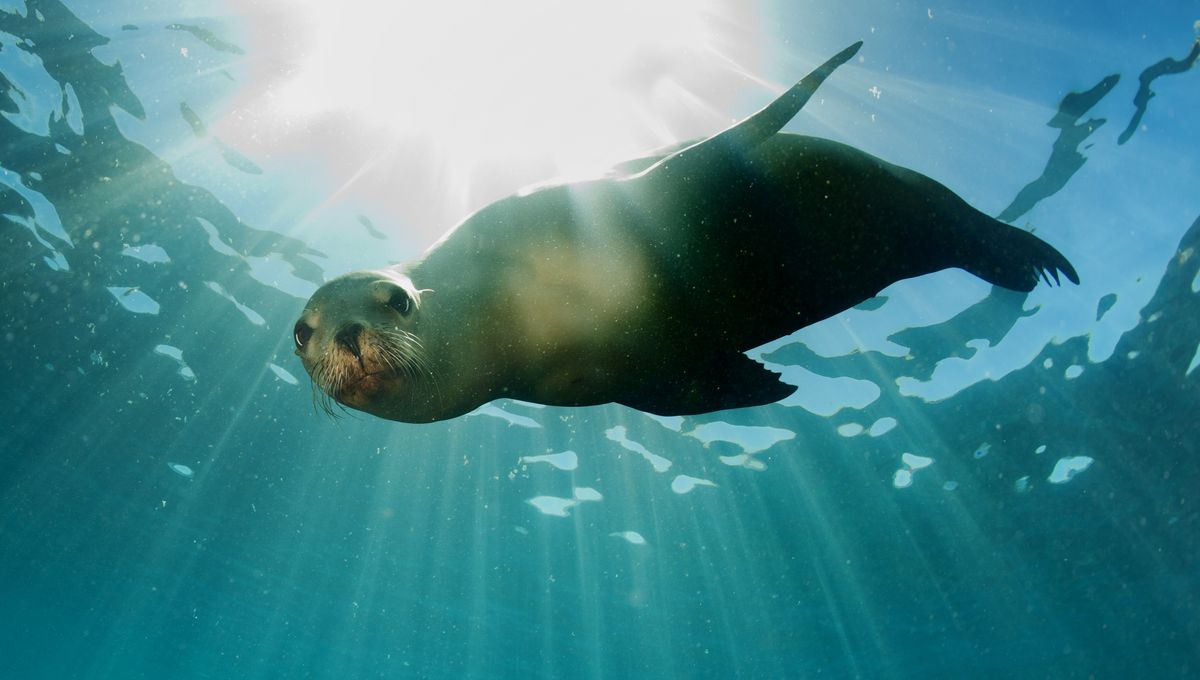
Under normal circumstances, seeing a sea lion on the beaches of California would be a pleasant experience. These animals are social and gregarious and are the most abundant species of pinnipeds on this coast. However, beach goers are now being warned to keep an eye out for unusual behavior among these marine mammals as a toxic algae bloom could be making them more aggressive.
Visitors and locals are being asked to avoid any sea lions that exhibit strange behavior, such as swinging their heads back and forth, foaming at the mouth, or showing seizure activity, as they are likely suffering from domoic acid toxicity.
What is Domoic Acid?
Domoic acid is produced by an algae called Pseudo-nitzschia australis, a phytoplankton that releases this neurotoxin during certain harmful algal blooms. When enough of the toxin accumulates in the systems of small prey, like sardines and anchovies, they can pass it onto the animals that feed on them – especially sea lions. Once ingested, the toxin attacks the brain and heart, causing seizures and heart failure. Normally, the toxin will be flushed from the animal’s body over a period of time, but repeated exposure can lead to permanent effects and death.
The phytoplankton responsible grows when coastal ecosystems provide the most favorable conditions, such as when upwelling occurs, bringing typically deep-water nutrients to the surface which proliferate growth. This tends to occur during seasonal transitions between spring and fall, but it is possible that climate change and El Niño are driving this latest bloom.
Under normal circumstances, late June is a time when sea lions travel to the beaches of Channel Islands, near Los Angeles, where they will have their pups. But this year their journey has coincided with this deadly bloom.
The current crisis
At the moment, marine mammal rescue teams are receiving up to 300 reports a day of sea lions behaving strangely, and around 150 have been found dead. Dozens of dolphins have also been found dead due to the toxin.
Experts are warning people to stay away from the animals and not to interfere with them at all.
When called to a suspected site with an infected animal, rescuers will establish a perimeter around it to allow for monitoring while also explaining to the public what the situation is. For the safety of everyone, including the sea lions, people are required to stay a minimum of 15 meters (50 feet away). This is a bit longer than the length of the average school bus in the US.
This is the worst domoic acid event to date, according to Alissa Deming, a vet at the Pacific Marine Mammal Center in Orange County. It has led some sea lions to become violent if they are approached by humans.
According to the California Marine Mammal Stranding Network, “Visual signs of domoic acid observed by CIMWI volunteers included: disorientation, lethargy, bulging eyes, impaired locomotion (unable to get out of surf), debilitated cognitive ability (unaware of surroundings, agitation), rhythmic head bobbing and weaving, uncontrollable body movements, grand mal seizures, being unresponsive, and continued degradation of these health signs as well as lack of spontaneous recovery and sudden death.”
Domoic Acid can also affect humans if they consume it. This causes what is called Amnesic Shellfish Poisoning (ASP), which is caused by eating contaminated shellfish. ASP can lead to sickness, diarrhea, dizziness, headaches, disorientation, and short-term memory loss. In severe cases, an intoxicated person can experience seizures, weakness, paralysis, and even death.
This is one of the reasons why it is important to maintain marine coastal systems and to limit climate change. This will help protect ecological diversity, but it will also protect us.
“Marine mammals are sentinels of ocean health, meaning they can alert us to potentially dangerous environmental changes in the ocean”, California Marine Mammal Stranding Network explained. “Sick and stranded marine mammals warn us about changing ocean conditions. Marine mammals that have been poisoned by domoic acid help protect human health by demonstrating the need for screening shellfish and other seafood for biotoxins.”
Source Link: A Deadly Neurotoxin Is Making Sea Lions Aggressive Towards People In California